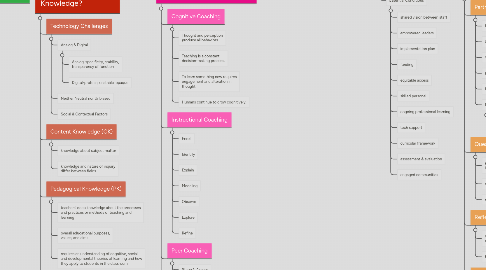
1. Technology, Coaching and Community
1.1. Cognitive Coaching
1.1.1. Thought and perception produce all behaviors.
1.1.2. Teaching is a constant decision-making process.
1.1.3. To learn something new requires engagement and alteration in thought.
1.1.4. Humans continue to grow cognitively.
1.2. Instructional Coaching
1.2.1. Enroll
1.2.2. Identify
1.2.3. Explain
1.2.4. Modeling
1.2.5. Observe
1.2.6. Explore
1.2.7. Refine
1.3. Peer Coaching
1.3.1. Stage 1: Assess
1.3.2. Stage 2: Set Goals
1.3.3. Stage 3: Prepare
1.3.4. Stage 4: Implement Activities
1.3.5. Stage 5: Analyze & Debrief
1.4. Beglau, M., Hare, J.C., Foltos, L., Gann, K., James, J., Jobe, H., Knight, J., Smith, B. (2011). Technology, coaching, and community. ISTE White Paper. [Special Conference Release]. http://www.instructionalcoach.org/images/downloads/ISTE_Whitepaper_June_Final_Edits.pdf
2. What is Technological Pedagogical Content Knowledge?
2.1. Technology Challenges
2.1.1. Analog & Digital
2.1.1.1. Analog-specificity, stability, transparency of function
2.1.1.2. Digital-protean, unstable, opaque
2.1.2. Neither Neutral nor Unbiased
2.1.3. Social & Contextual Factors
2.2. Content Knowledge (CK)
2.2.1. knowledge about subject matter
2.2.2. knowledge and nature of inquiry differ between fields
2.3. Pedagogical Knowledge (PK)
2.3.1. teachers’ deep knowledge about the processes and practices or methods of teaching and learning
2.3.2. overall educational purposes, values, and aims
2.3.3. requires an understanding of cognitive, social, and developmental theories of learning and how they apply to students in the classroom
2.4. Pedagogical Content Knowledge (PCK)
2.4.1. transformation of subject matter
2.4.2. teaching, learning, curriculum, assessment and reporting
2.5. Technology Knowledge (TK)
2.5.1. state of flux
2.5.2. Fluency of Information Technology
2.5.3. evolving over a lifetime of generative, open-ended interaction with technology
2.6. Technological Content Knowledge (TCK)
2.6.1. understanding of how technology and content influence and constrain one another
2.6.1.1. understand technologies best suited for subject matter
2.6.1.2. understand how content dictates or changes technology
2.7. Technological Pedagogical Knowledge (TPK)
2.7.1. understanding of how teaching and learning can change when particular technologies are used in particular ways
2.7.2. requires a forward-looking, creative, and open-minded seeking of technology use for the sake of advancing student learning and understanding
2.8. Technology, Pedagogy, and Content Knowledge (TPACK)
2.8.1. emergent form of knowledge going beyond 3 core components
2.8.2. simultaneously integrating knowledge of technology, pedagogy, and content
2.9. Koehler, M. J., & Mishra, P. (2009). What is technological pedagogical content knowledge? Contemporary Issues in Technology and Teacher Education, 9(1). Retrieved from http://www.citejournal.org/vol9/iss1/general/article1.cfm
3. Partnership Learning
3.1. Partnerships
3.1.1. Equality
3.1.2. Choice
3.1.3. Voice
3.1.4. Reflection
3.1.5. Dialogue
3.1.6. Praxis
3.1.6.1. the act of applying new ideas to our own life
3.2. Question Recipes
3.2.1. proven approaches for improving dialogue
3.2.2. open-ended
3.2.3. non-judgemental
3.3. Reflection Learning
3.3.1. reflect on how they can apply content to their lives
3.3.2. How can I use these new ideas?
3.4. Experiential Learning
3.4.1. experience the learning
3.4.2. simulations
3.5. Knight, J. (2002). Partnership Learning [Fieldbook]. The Teacher-Guided Professional Development Series. The University of Kansas Center for Research on Learning. http://instructionalcoach.org/images/partnership/PartnershipLearningFieldbook.pdf
4. Development of a Virtual Technology Coach to Support Technology Integration for K-12 Educators
4.1. Technology Skills
4.2. Staff need to interact with coach and share resources
5. NETS-C eBook
5.1. Essential Conditions
5.1.1. shared vision between staff
5.1.2. empowered leaders
5.1.3. implementation plan
5.1.4. funding
5.1.5. equitable access
5.1.6. skilled personel
5.1.7. ongoing professional learning
5.1.8. tech support
5.1.9. curricular framework
5.1.10. assessment & evaluation
5.1.11. engaged communities

